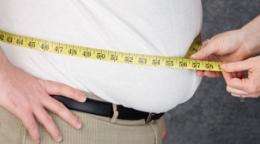A matter of great weight

Obesity is described today as a global epidemic. If no action is taken, a billion people will be overweight by 2030. This is an acute challenge to our society, says researcher Claes Held.
So the Healthful Life is back in fashion. On Facebook there are reports from every gym session, coffee breaks are devoted to analysing new diets, and under the heading “The Body as a Brand” the Swedish daily Dagens Nyheter explains that “to exercise or not to exercise” is no longer the question—the ideal life style is now tilting toward extreme health and elite levels. But there is another side to that coin. We are not so eager to expose it in private, but it is becoming all the more evident in the statistics—the fact that we move around less and weigh more than any previous generation.
“Current studies show that a sitting-still pandemic is spreading around the world. Some 69 per cent of the population in developing countries and 37 per cent in industrialized countries state that they hardly move around at all in their spare time. The consequences are obvious, with more and more cases of obesity, diabetes, and cardiovascular diseases,” says Claes Held.
Being overweight is described today as a global epidemic. If nothing is done, some one billion people will be overweight by 2030. Part of the problem is the rapid increase among young people. In Sweden the curve is beginning to level out, but the situation is nevertheless serious. Every fifth child today is counted as overweight, and since 2009 in Uppsala care and research have been especially targeting severely obese young people between the ages of 3 and 18 years, several of whom have already begun to develop type 2 diabetes.
“The further down in age the problem reaches, the more serious the complications and the greater the demands on society’s economic resources for health. We need more knowledge about the early phases of obesity and the mechanisms behind weight-related disorders, and we’re seeing now how this research is receiving ever higher priority in the EU,” says Professor Peter Bergsten.
Beta-JUDO is a topical example of EU-funded initiatives in the struggle against overweight among children and adolescents. In February thirty top researchers from seven countries gathered in Uppsala to draw up the guidelines for the project.
“We will be focusing on the role of insulin-producing beta cells in the development of obesity and type 2 diabetes. If we can find a method to reduce the increased production of insulin and thereby the sense of hunger, not least for young people in the risk zone, we will be taking an important giant step in the right direction,” says Peter Bergsten, who is coordinating the project. Beta-JUDO brings together eleven preclinical and clinical partners, a set-up that requires good communication to harmonize the diverse activities that are to be undertaken across Europe.
“The group consists of researchers with a great deal of experience and knowledge. My ambition is for the encounter between basic research and clinical research to generate new approaches to treating this group of patients,” says Peter Bergsten.
So it is not a coincidence that obesity-related findings are currently flooding the media. One study that recently attracted a great deal of international attention shows that lack of sleep can also affect the metabolism and eating habits of humans.
“One sleepless night lowers the body’s consumption of energy by five per cent, and at the same time we store 20 per cent more energy than normal. What’s more, the blood flow increases in the parts of the brain that influence how we relate to food in a way that we have previously only observed in extremely obese individuals. This indicates that lack of sleep cofounds the metabolic clock,” says researcher Christian Benedict.
On the other hand, today’s demands for working overtime and constantly being online entail that more and more people find it difficult to get to bed. Statistics show that the average European sleeps one hour less per night today than twenty years ago.
“Our sleep needs are individual, but we all need to satisfy them. A simple way to calculate your own needs is to jot down how long you sleep three nights with no alarm clock. The average time corresponds to how much you should sleep per 24 hours,” says Christian Benedict.
And how about the impact of sitting still on your waistline and health? A few days into the new year the world press reported that owning a car and a TV increase the risk of having a heart attack by a full 27 per cent in low- and middle-income countries. Time to park your car for good?
“Well, it’s rather a matter of not driving more than you need to. The study primarily confirms our need for physical movement. Even simple activities like yoga or walks entail noticeably lower risk of heart attacks, and this effect increases with the amount of physical activity,” says Claes Held.
The findings, based on 29,000 participants in 52 countries, are an elaboration of the 2004 Interheart study. This study showed how nine risk factors, all of which can be influenced by our lifestyle—like smoking, stress, diabetes, and physical activity—explain up to 90 per cent of all heart attacks.
“All the TV watching, car driving, and desk work have made sitting still an acute challenge to our society. To save our health and the costs of care, we need to get physical activities back into our everyday lives. Ride your bike to work or get off the bus one stop early—whatever suits your situation in life—and you’ll keep your heart in good shape,” says Claes Held.
Add the fact that a physically active life has a positive effect on several of the other nine risk factors, and the return on your effort invested is multiplied. The reward is a longer, thinner, and healthier life.


















